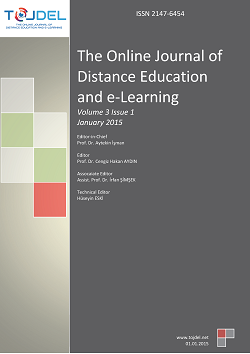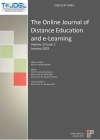TOJDEL - Volume 3 - Issue 1 - January 2015
 COMPARING STUDENT RESEARCH COMPETENCIES IN ONLINE AND TRADITIONAL FACE-TO-FACE LEARNING ENVIRONMENTS
COMPARING STUDENT RESEARCH COMPETENCIES IN ONLINE AND TRADITIONAL FACE-TO-FACE LEARNING ENVIRONMENTS Jodi Constantine Brown, Hyun-Sun Park
Abstract: This research compares a completely asynchronous Master of Social Work (MSW) online research methods class with its traditional face-to-face counterpart using standardized measures of practice evaluation knowledge and research self-efficacy. Results indicate that students’ knowledge and research self-efficacy improved between pretest and posttest, with no significant difference between online learners and traditional face-to-face students.
 ELECTRONIC EDUCATION (E- EDUCATION) AND ITS EFFECT IN DISTANCE LEARNING PROGRAMMES IN NIGERIA
ELECTRONIC EDUCATION (E- EDUCATION) AND ITS EFFECT IN DISTANCE LEARNING PROGRAMMES IN NIGERIA Adesanya Olusegun Oyeleye, Idogwu Kingsley Uche
Abstract: This paper examined the relevance of electronic education, its effects on effective actualization of distance learning programmes in Nigeria by defining the concept of electronic education in improving standard of the learning process. It also discussed the problems of this form of education. An, overview of the National Policy on Education (NPE) on electronic education and its initiates in Nigeria educational system was discussed. Also, it elaborated on the importance of virtual library and ICT in effective distance education programmes and concluded by suggesting the way forward in improving electronic education system for advancement of distance education in Nigeria.
 FLIPPING THE CLASSROOM: WHAT WE KNOW AND WHAT WE DON'T
FLIPPING THE CLASSROOM: WHAT WE KNOW AND WHAT WE DON'T Siti Hajar Halili, Zamzami Zainuddin
Abstract: Flipped classroom is an element of blended learning and it is the reverse of the traditional classroom. The students do not listen to the lectures delivered in the classroom but outside the classroom through online video lecture. The teachers record themselves explaining the subject or get videos from free website such as Youtube to share with students to be watched outside the class. The flipped classroom has several advantages; students become more motivated and confident while discussing in the classroom because they have prepared by watching video lectures before coming to class, the classroom activities become more student-centered rather than teacher-centered because the teachers just act as facilitators. However, some disadvantages are also found in the flipped classroom It is a new model of learning and not all teachers and students are ready to apply it. This paper will briefly explain the use of flipped classroom as a new model of teaching-learning activity.
 IMPLEMENTING A VIDEOCONFERENCING STUDIO IN CAPE VERDE TO SUPPORT A BLENDED LEARNING EDUCATION SYSTEM
IMPLEMENTING A VIDEOCONFERENCING STUDIO IN CAPE VERDE TO SUPPORT A BLENDED LEARNING EDUCATION SYSTEM Rogerio Roth
Abstract: In 2004, the Calouste Gulbenkian Foundation invited the University of Aveiro to develop an education and training program in advanced topics of ICT for Cape Verde. The focus should be on technologies to support the development of distance education. Two years later, when the program was started, the University of Aveiro had a high-performance videoconferencing Studio installed by the Foundation for National Scientific Computing. However, the investment to duplicate this high quality structure and operating costs were not compatible neither with the project’s budget nor with the technological options available in Cape Verde. This paper demonstrates the decision-making process by an economically viable option to meet the needs and local peculiarities.
 LEARNING ENGLISH WRITING VIA A WEB DIGITAL PLATFORM: A CASE OF TAIWANESE ABORIGINAL NURSING STUDENTS’ PARTICIPATION AND LEARNING OUTCOMES
LEARNING ENGLISH WRITING VIA A WEB DIGITAL PLATFORM: A CASE OF TAIWANESE ABORIGINAL NURSING STUDENTS’ PARTICIPATION AND LEARNING OUTCOMES Chunfu Charlie LIN, Wei-Chieh Wayne YU, Jenny WANG, Mei-Hsin HO
Abstract: This paper reports on a research study that examined the learning experience of the minority students in a predominantly social networking, web digital platform and its impact on their learning outcomes. Participants were 162 aboriginal students aged between 18 and 23 at a nursing college in southern Taiwan. Learners were asked to take compulsory English language courses and expected to pass an English Proficiency Test as an exit requirement of the university. Writing skill is a crucial element in determining the success of the test takers. Results revealed that the participants’ perceptions and learning outcome to be significantly related to the chosen instructional pedagogy. This study made theoretical, methodological, as well as contextual contributions to the field of online learning and provided several teaching implications for teaching English writing using web-based technologies. It also seeks to help researchers and educators find meaningful ways that will improve the attitudes of aboriginal students in the learning environment, and continue to evaluate ways to help these students connect with the process of learning.


